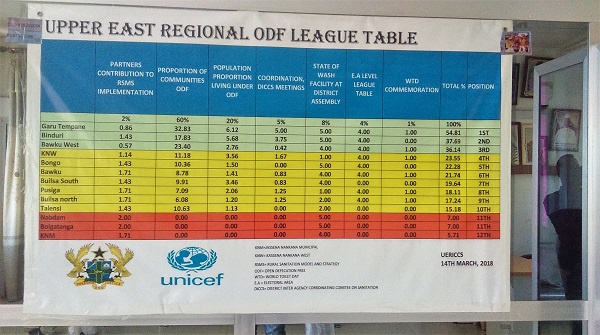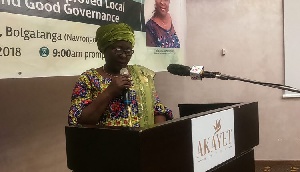Four assemblies in the Upper East region have caused financial loss to the United Nations International Children’s Emergency Fund (UNICEF) to an amount the agency is yet to reveal but says is “huge put together”.
The four accused local government authorities include the Bawku West District, the Pusiga District, the Bawku Municipality and the Builsa North District.
The UNICEF put the cash in their trust in phases between 2012 and 2017 to help sensitise their communities to the harmful effects of open defecation— a widespread practice the UN authority, together with the Government of Ghana (GoG) among other partners, is pushing very hard to eradicate from the region.
But whilst some of the 15 assemblies in the region could show some encouraging results for the sanitation funds received from the UN entity, those four assemblies could not account to a disappointed UNICEF team.
“We’ve dropped some of the districts that are not performing well. We give you funds to work. At the end of the day, we come, we don’t have results to show. We also asked ourselves, ‘Why would we continue funding you if we are not getting results?’
“You go in there, the results are just not coming whilst others are making it. So, we’ve dropped some of them and we have picked some. We are now opening it to everybody. Apply and say you will give us results. We are now going to give you support based on the results we get,” announced the Upper East Regional Consultant for the UNICEF, Dr. Eva Akanchalabey.
The issue came to light when the Upper East Regional Inter-agency Coordinating Committee on Sanitation (UERICCS) held a review meeting in Bolgatanga, the regional capital, with a group of people the UNICEF calls “Social Norms Campaign Champions”. The group is composed of traditional authorities, religious leaders as well as players in the media and music industries.
Rankings of the Assemblies on ODF League Table
An assessment table, which reflects the degree of commitment each assembly in the region has shown so far towards ending open defecation, was presented in the meeting.
Divided into seven categories, the table shows the marks each district and municipality got in 2017 with or without funding support from the UNICEF.
Garu-Tempane, who was excellent at the World Toilet Day Commemoration but was not so good at the Partners’ Contribution to Rural Sanitation Model and Strategy (RSMS) Implementation, tops the chart with 54.81%. Binduri, who was more than average at organising District Inter-agency Coordinating Committee on Sanitation (DICCS) meetings and was excellent at the Electoral Area Level League Table, is second with 37.69%.
Bawku West, with an excellent grade at World Toilet Day Commemoration but less than an average at the Partners’ Contribution to RSMS Implementation, is third, obtaining 36.14%. Kassena-Nankana West is fourth with 23.55% after a poor mark at the State of Water, Sanitation and Hygiene (WASH) Facility at District Assembly but an excellent at the Electoral Area Level League Table.
Bongo, who has more than an average at the State of WASH Facility at District Assembly but abysmal at the World Toilet Day Commemoration, occupies the fifth position on the table with 22.28%. Bawku, with more than an average mark at Partners’ Contribution to RSMS Implementation and an excellent at the World Toilet Day Commemoration, is sixth on the ODF table with 21.74%.

Upper East Regional Consultant for UNICEF Dr. Eva Akanchalabey addressing Social Norms Campaign Champions in the meeting
Builsa South follows with 19.64%, having obtained over an average mark at Partners’ Contribution to RSMS Implementation but nothing to show for the World Toilet Day Commemoration. With 18.11%, Pusiga, who got a low mark at State of the WASH Facility at District Assembly but an excellent at Electoral Area Level League Table, is eighth on the table.
Builsa North, who was abysmal at Coordinating DICCS meetings but excellent at the World Toilet Day Commemoration, is ninth with 17.24%. Talensi is tenth with 15.18%, scoring more than an average at Partners’ Contribution to RSMS Implementation and nothing at the World Toilet Day Commemoration. Nabdam follows with 7%, after getting excellent in Partners’ Contribution to RSMS Implementation but nothing almost throughout the rest of the categories.
Bolgatanga Municipality, with 7%, occupies the same eleventh position as Nabdam, scoring the same marks. Kassena-Nankana Municipality is twelfth at the bottom of the table, obtaining 5.71% after obtaining an average at State of the WASH Facility at District Assembly and more than an average at Partners’ Contribution to RSMS Implementation.
509 Communities Declared Open-Defecation-Free

Five hundred and nine (509) communities, representing 26% of the 1,990 communities in the region, have been declared open-defecation-free (ODF).
Three hundred and fifty-seven (357) of the 509 ODF communities were supported by the UNICEF through a Community-Led Total Sanitation (CLTS) approach to attain that status.
The UNICEF is not alone in the campaign being waged against open defecation and urination. Other organizations like the World Vision International, the Catholic Relief Services Ghana, and the WaterAid Ghana are also on the ship, highlighting the crushing impact of the practice on public health.
The concerted effort is what has made it possible for households in the 509 communities, who used to answer to the call of nature in the bush, to have their own decent toilet facilities today.
The review meeting saw the Social Norms Campaign Champions not only relay the activities they had carried out in their own way after the previous meeting to help eradicate open defecation in the region but also draw an action plan for the last quarter of the year against the practice.
“We should not always be expecting money from donor agencies,” Jennifer Mankatah, a communications consultant with the UNICEF, stressed during the discussion. “Please, let us also see how we can do things on our own. The money is not everlasting. I’m applauding the Upper East regional champions because, from all that we have been doing in the various regions, they are the most noticeable,” she remarked.
Regional News of Monday, 24 September 2018
Source: starrfmonline.com
Four Assemblies cause financial loss to UNICEF funds
Entertainment
















